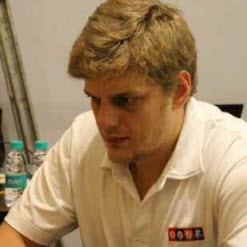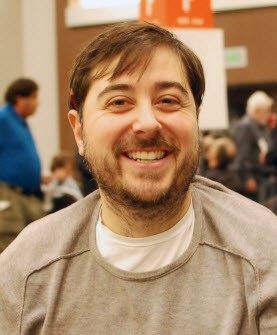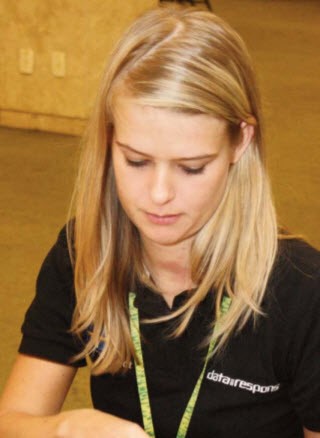
It is with great sadness that we report the passing of one of the game’s great supporters, Naren Gupta, who died aged 73 on Christmas Day. Born in India in 1948, Naren was a graduate of the Indian Institute of Technology in Delhi, of the California Institute of Technology and of Stanford University. A technology entrepreneur and President/CEO of Integrated Systems Inc, he is widely acknowledged as a major contributor to today’s global technology.
In the bridge world, Naren led one of the major teams on the international circuit. We have reported on many of his victories in this column: he won a number of the early Alt events including the MontreAlt, playing on teams with Zia Mahmood, Cedric Lorenzini, Thomas Bessis, Bauke Muller, Simon de Wijs, Curtis Cheek, David Gold, Frederic Volcker and Huub Bertens.
Naren is survived by his wife, Vinita, who continues playing with her own team in the current Alt events, and their two daughters.
RIP.
The OCBL July Cup
There were plenty of world-class players in action to entertain those watching online when sixteen teams lined up at the start of the July Cup, run under the auspices of the Online Contract Bridge League. The format was a four-day qualifying event of nine 16-board matches. The leading eight teams would then advance to the knockout stage on the final day.
As usual, we begin with some problems. We shall discover later how your choices would have worked. First, an opening lead: you are East with:
What do you lead?
Next, with neither side vulnerable, you hold as North:
What action do you take?
While you consider those, we begin in Round 1, where two highly-fancied teams flying the Cross of St George, BLACK (England/Sweden) and HARRIS (England/Bulgaria), met head to head. At half of the 16 tables, E/W were allowed to play in 4♥, scoring +620 or +790 on Board 10. At the other eight tables, N/S bid on in spades, but only one declarer timed the play accurately:

The Bulgarians quickly got to their game in hearts, but Gunnar Hallberg was never going to be shut out after Simon Hult had doubled the weak two opening. Todor Tihilov kicked off the defence with the ♥A and a second heart, declarer ruffing in dummy. When the ♠J was led, Rumen Trandafilov stepped up with the ♠A, cashed the ♦A, and then played a third round of hearts. Hallberg ruffed in hand, crossed to the ♦K, and took the marked trump finesse against West’s queen. Then came the key play: Hallberg crossed to dummy in clubs and led the ♦Q. When West followed suit, though, Hallberg ruffed dummy’s winner, thus reducing his trump length to match that held by West. A club now returned the lead to dummy and declarer led a winning diamond. West pitched his last heart, so Hallberg threw his remaining club but, whatever he did, West could not score a trick with his guarded ♠Q. Nicely played! N/S +790 and 14 IMPs to BLACK when declarer at the other table failed by a trick in the same contract.
HARRIS led 21-10 at the midway point of the match, but the second half was all one-way traffic, BLACK winning it 29-0 to record an 18-IMP victory. The largest win was recorded by SCHWARTZ (USA), whom defeated SCORWAY (Scotland/Norway) 58-12 to top the table after the first match.
Playing the leaders in Round 2, it was déjà vu for the HARRIS team as they again found themselves on the wrong end of a second-half whitewash. Both East players in this match had to find an opening lead on the first of this week’s problem hands.
After Schwartz had backed in over East’s heart pre-empt, Jenny Wolpert got her side, at least briefly, to a contract that could be made. Indeed, N/S managed to reach game in clubs at only two of the 16 tables, and both in the same match. Italians Manno/Di Franco scored +600 in 5 ♣ for BRAIN GLUCOSE (USA/Italy), but that was a 4-IMP loss when Nikolenkov/Szegedi for HUNGARY (Hungary/Switzerland) were doubled in the same contract.
Playing game in diamonds was much more challenging and, although a handful of declarers made the attempt, only Schwartz received enough assistance from his friends to go plus. Eduard Malhasyan led the ♥K, which gave declarer a glimmer of hope. Schwartz won with the ♥A, immediately played a spade to the queen, and cashed the ♠A to discard his heart loser. When declarer then led the ♦Q from dummy, West made the mistake of covering with the king. Declarer won with the ♦A, cashed the ♦J dropping East’s ten, drew the last trump with the ♦9, and played on clubs. The defenders could make only their two high clubs: N/S +600 looked like an excellent result for the Americans.

In the replay, East also opened with a heart pre-empt, but Shahzaad Natt made a takeout double on the South cards. Niall Igoe took a shot at 3NT but, when Vincent Demuy doubled on the way out, he reconsidered and removed himself instead to game in his long suit. Demuy doubled again, leaving John Kranyak to find an opening lead.
Kranyak, who won the Junior Teams title at three World Championship events (in 2001, 2005 and 2006) representing USA, gave declarer no chance, opening with the ♣2. Demuy took his two club winners and duly delivered his partner’s ruff. The defence later scored the ♦K to beat the contract by two: N/S -500 and 15 IMPs to SCHWARTZ.
SCHWARTZ led the match 27-18 at the midway point, and then blanked their opponents 28-0 in the second half to record their second large win and retain their place at the top of the table. BLACK also won by almost a maximum, though, and they trailed by little more than 2 VPs with an all-English team, LESLIE, climbing up into third place.
The leading teams both had very tough assignments in Round 3, SCHWARTZ taking on the regular winners of Alt events, MOSS (USA/Switzerland), whilst BLACK faced GILLIS (Scotland/Norway). Board 11, where Andrew McIntosh faced this week’s bidding problem, generated a significant swing in both key matches:

Tom Paske passed as dealer but then doubled East’s jump to 4♥ after his partner’s diamond overcall. McIntosh’s only realistic choices were, presumably, Pass, 5♣ and 6♣. What does partner need to make slam a reasonable proposition? Probably not much more than the ♣A and one of the top spades, so perhaps Tosh’s 5♣ bid erred on the conservative side. There was little to the play: with the defenders’ just making one spade trick: N/S +420.
There was no alert of North’s 2♦ bid, so I assume it was just natural and forcing rather than showing any sort of club fit. Having opened this marginal South hand, Boye Brogeland’s free 4♣ bid may seem like too much. If 2♦ was forcing to game, though, then perhaps 4♣ was just descriptive rather than suggesting anything extra. The upshot, though, was that after an exchange of cue-bids, Christian Baake unleashed RKCB and then bid the grand slam when he found that all of the key cards were present. The contract was not without play, but declarer needed diamonds 3-3 in order to get both spade losers away. When that chance failed, he was one down: N/S -50 and 10 IMPs to BLACK.
GILLIS had led 16-12 at the midway point of the match but, for the second time in three matches, BLACK whitewashed their opponents in the second half, winning it 28-0 to score a 24-IMP victory that would carry them to the top of the leaderboard.
In the other key match:
For the Polish Bermuda Bowl winners now flying the white cross of Switzerland, Michal Nowosadzki opened the South hand with a Polish Club (clubs, weak notrump or any 17+). Not content with the two-level, John Kranyak stretched to intervene with a 3♥ overcall, severely cramping Jacek Kalita’s options. 4♣ was, presumably, natural and forcing but, when Nowosadzki could only raise to game, Kalita was left with a similar decision to McIntosh in the other match. Here, Kalita was facing an opening bid, whereas Tosh’s partner had passed originally. However, Tosh had the implication that Paske would not hold three diamonds (or he might have bid 5♦ rather than double), whereas Kalita had nothing to suggest that his partner did not hold the balanced, weak notrump hand type, so an unavoidable diamond loser was quite possible. Very tricky! Again, though, conservatism won the day: N/S +420.
Only one of the four North/South pairs in the top two matches judged the level correctly, and that was Americans Robinson/Grossack:

Robinson also passed as Dealer but competed with 5♣ after Adam Grossack had made a takeout double of West’s 3♥ opening. Grossack correctly judged to raise to slam and Roger Lee did as well as he could to limit the loss by taking the save at the six-level.
The defence was accurate: Grossack cashed his two high diamonds and then switched to the ♣K. Declarer ruffed and played a trump to North’s ace, but Grossack now played a third round of diamonds, enabling his partner to score the ♥J by overruffing dummy. The ♠A was the fifth defensive trick: N/S +800 and 9 IMPs to SCHWARTZ.
This match was nip-and-tuck all the way, and MOSS emerged victorious by the smallest of margins, 38-37. That was still enough to keep SCHWARTZ in the top two, though. In the other key match of Round 3, LESLIE defeated BRAIN GLUCOSE 34-27, which left those two teams occupying third and fourth place after three matches.
The leading two teams met head-on in round 4, whilst third-placed LESLIE took on the dangerous DONNER (USA/Sweden). SCHWARTZ led 7-0 against BLACK after the first eight deals, so the boards were rather dull, perhaps? Apparently not, as DONNER blitzed LESLIE 48-0 over the same eight boards. Board 2 summed up the first-half action in both matches:

After what looks to me like a normal start to the auction, McIntosh had just about shown his whole hand (a strong 1-4-3-5 shape) after three bids. Blackwood soon put in an appearance and, when McIntosh confirmed possession of all key cards with 5NT, Tom Pasked jumped to the grand slam in diamonds.
There are numerous routes to 13 tricks. With seven top tricks in the side suits, declarer can ruff a spade in dummy to give him six trump tricks. Paske actually won the opening trump lead and drew four rounds. He then played three top clubs and set up the ♣9 as his thirteenth trick via a ruffing finesse against South’s ♣J. E/W +1440.
The American auction began in the same way. John Kranyak agreed diamonds via a splinter in hearts but the end result was the same: E/W +1440 and an honourable push.
In the other top match, both West players were playing transfer responses to a 1♣ opening, so both began with a 1 ♠ response:
Ollie Burgess’s 1♠ response suggested diamonds, but could have shown a number of hand types without a four-card major. When Tim Leslie then reversed into hearts, Burgess advanced with a semi-natural 2♠ bid that, presumably, strongly implied 5+ diamonds. Leslie’s jump to 3NT, though, did not advance his side’s cause and, when Burgess now advanced with 4♣, the partnership was locked into the wrong suit. Leslie’s 4♦ bid was now just a control rather than support. Not only did they finish at the wrong level but, unluckily, in the suit that split 5-0.
At seven of the sixteen tables, East/West played this deal in an unfortunate 7♣. At two others, declarer played in 6♣ and survived the 5-0 split. Leslie did not, though, as he won the opening spade lead and started trumps by cashing the ♣Q. He could not then knock out the ♣J without being forced. The successful declarers started with a club to the king and were then able to restrict South to just one trump trick although, of course, that was of little comfort to those playing in a grand. E/W -50.

After a similar start, Cecilia Rimstedt advanced with 2NT, presumably showing spade stopper(s). Each player than repeated their minor suit before Kevin Dwyer limited his hand with 3NT. Rimstedt was nowhere near done, though, and she showed her club fit at the four-level. Blackwood followed and the partnership found their way to the doomed 7♣ , but Kevin Dwyer had heard enough to convert to notrumps at the eleventh hour.
Rimstedt won the opening heart lead and cashed the ♣A, immediately exposing South’s jack. The ♣10 came next and was run, establishing declarer’s fourth trick in that suit. With five diamonds, three hearts and one spade to go with four clubs, declarer was soon claiming her contract. E/W +1520 and 17 IMPs to DONNER.
BLACK won the second half 24-9 to win the match 24-16 and open a lead of almost 10 VPs over their opponents at the top of the leaderboard. LESLIE won the second half of their match 13-11, but still dropped down to fifth place whilst DONNER climbed onto the podium.
These were the standings after four of the nine qualifying matches:
| BLACK | 63.32 VPs |
| SCHWARTZ | 53.89 |
| DONNER | 50.64 |
| HUNGARY | 45.75 |
| LESLIE | 44.74 |
| RIPPEY | 43.90 |
| MOSS | 42.39 |
| BRAIN GLUCOSE | 42.18 |
| PIGOT | 41.96 |
| FREDIN | 40.75 |
We will be back next week to see the best of the action from the remaining qualifying matches.
